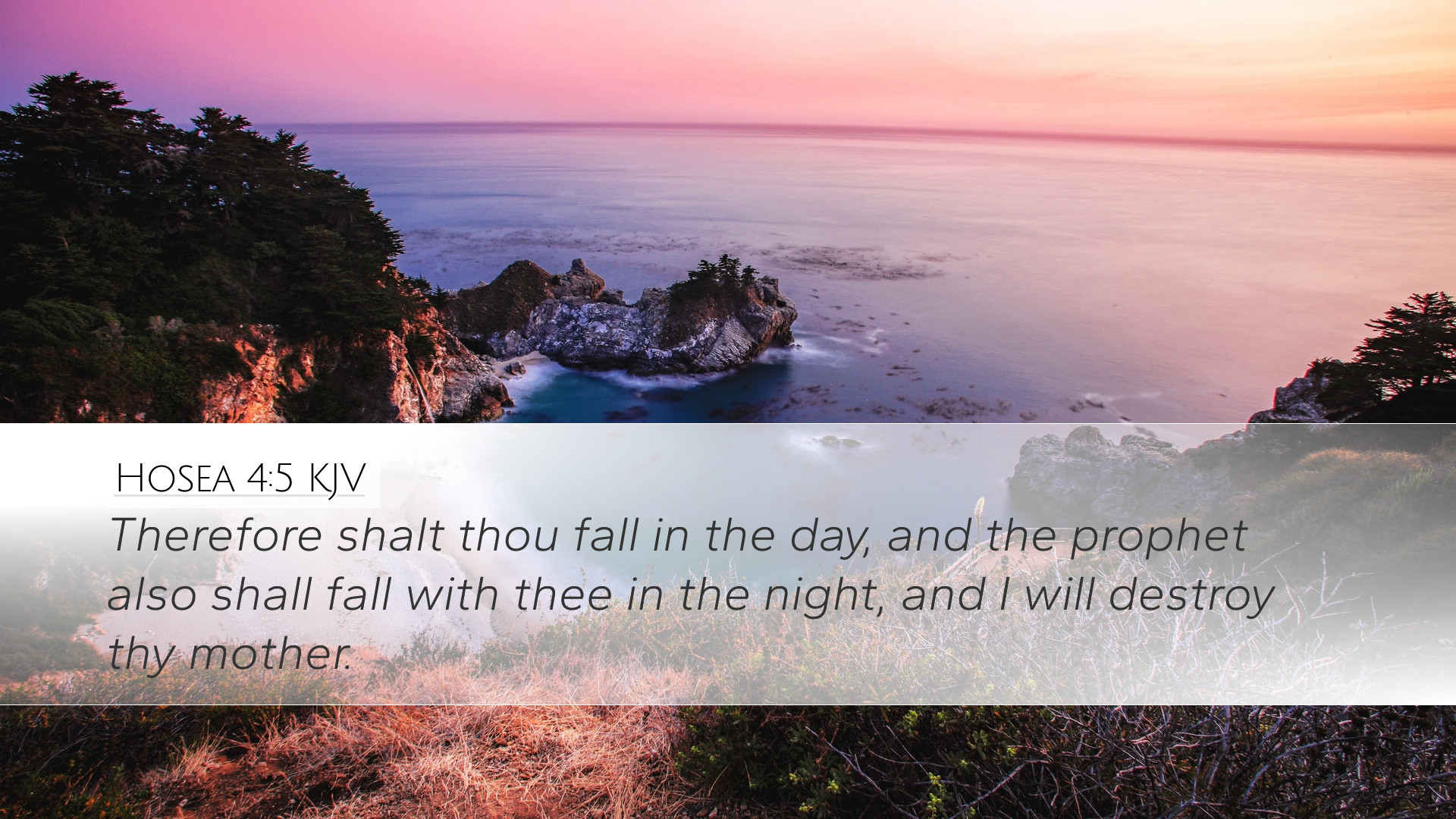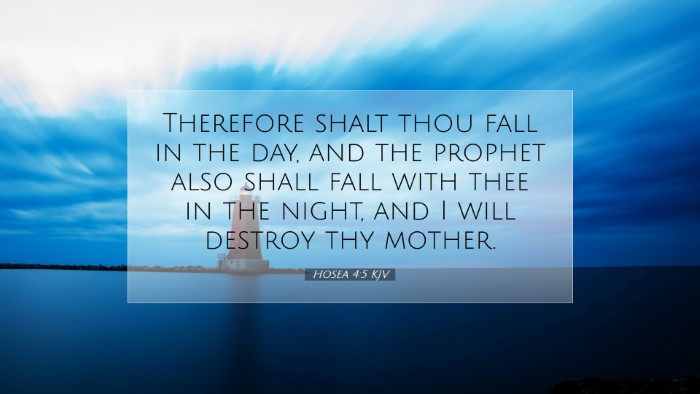Old Testament
Genesis Exodus Leviticus Numbers Deuteronomy Joshua Judges Ruth 1 Samuel 2 Samuel 1 Kings 2 Kings 1 Chronicles 2 Chronicles Ezra Nehemiah Esther Job Psalms Proverbs Ecclesiastes Song of Solomon Isaiah Jeremiah Lamentations Ezekiel Daniel Hosea Joel Amos Obadiah Jonah Micah Nahum Habakkuk Zephaniah Haggai Zechariah MalachiHosea 4:5
Hosea 4:5 KJV
Therefore shalt thou fall in the day, and the prophet also shall fall with thee in the night, and I will destroy thy mother.
Hosea 4:5 Bible Commentary
Commentary on Hosea 4:5
Bible Verse: Hosea 4:5 - "Therefore shalt thou fall in the day, and the prophet also shall fall with thee in the night, and I will destroy thy mother."
Contextual Background
The Book of Hosea is a prophetic text that addresses the spiritual and moral decay of Israel. Hosea, instructed by God, symbolizes God's unending love for His people while highlighting the consequences of their unfaithfulness. The phrases of judgment in this book are a call to repentance but also depict impending destruction for ignoring God's covenant.
Key Themes in Hosea 4:5
- Judgment: A theme prevalent in Hosea, God pronounces judgment upon Israel’s leaders, both civil and religious.
- Corruption of Prophets: The verse highlights the failures of false prophets who lead the people astray.
- Consequences of Sin: It emphasizes that sin leads to downfall, not just for the people, but for their spiritual leaders.
Insights from Matthew Henry
Matthew Henry notes that the verse demonstrates the inevitable consequences of rebellion against God. The judgment is pronounced in such a way that both the people and the prophets suffer the same fate, indicating a shared responsibility for the nation's spiritual condition. He emphasizes the seriousness of the prophet's role and how their failures contribute to the downfall of the people they represent.
Henry comments that falling by day signifies a public disgrace, while falling by night suggests hidden failures that culminate in visible judgments. The reference to "destroying the mother" is reflective of the totality of judgment, wherein the systemic issues are addressed, leading to a complete breakdown of the national identity.
Insights from Albert Barnes
Albert Barnes elaborates on the verse, asserting that the mention of the prophet’s fall denotes spiritual blindness prevalent in both the leaders and the followers of Israel. He asserts that such a downfall comes as a natural result of sin, with the prophets leading the people into greater moral decline.
Barnes points out that “the day” symbolizes the time of judgment, where the usual patterns of life will no longer ensure safety or stability. He also emphasizes collective judgment upon Israel stemming from their collective sin which leads to dereliction both of the people and their leaders.
Insights from Adam Clarke
Adam Clarke highlights the duality of the judgment mentioned in the verse. He suggests that the day signifies the time when God’s judgment should have been anticipated, as darkness is often associated with despair. Clarke reinforces that the prophet's demise in the night serves metaphorically to represent the misleading nature of false prophecies which leads God’s people into darkness rather than illuminating their paths.
Moreover, Clarke underscores that the destruction of “thy mother” can refer to the House of Israel as a whole, encompassing both the nation and its religious institutions that have departed from God’s intended purpose. This is significant as it illustrates the interconnectedness between the nation's moral standing and its prophetic guidance.
Theological Implications
Hosea 4:5 holds profound implications for understanding the role of leadership within the church and society. It serves as a warning against the consequences of corrupt leadership that can lead entire communities astray. Furthermore, it prompts an examination of the accountability that prophets and leaders bear before God regarding their guidance to the people.
Pastors and theologians may find this verse useful for discussing the responsibilities that come with spiritual leadership, emphasizing the need for integrity, sound doctrine, and authentic relationship with God. Likewise, it inspires a reflection on the enduring nature of God's judgment and grace, where even amidst warnings, God's desire for repentance remains prominent.
Practical Applications
- Integrity in Leadership: Leaders must embody the truth of God’s word genuinely.
- Congregational Responsibility: Churches are called to discern and uphold biblically faithful leadership.
- Awareness of Judgment: Regularly reflect on the nature of God’s dealings and the consequences of both personal and communal sin.
- Call to Repentance: Emphasize the importance of returning to God from paths of error, both individually and corporately.
Conclusion
Hosea 4:5 serves as a stark warning against disobedience and spiritual complacency, particularly in leadership. By studying insights from historical commentaries, readers can better appreciate the gravity of this verse within the narrative of Hosea. It reminds pastors, students, and scholars alike of the multifaceted nature of divine judgment and the prophetic responsibility in guiding God’s people toward holiness.


